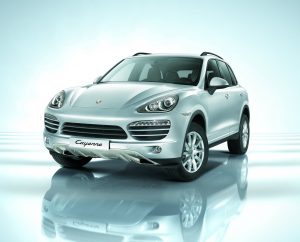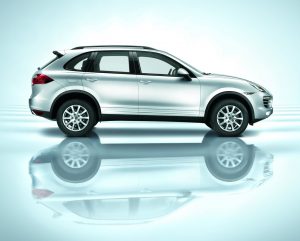Recalls: Porsche 92A Cayenne
Overview
Manufacturers, or importers, issue recalls for defects or faults which have the potential to cause injury. Generally, manufacturers will inform the original buyers if their vehicle is subject to a recall and of the steps required to remedy the defect or fault. Please note that the recalls below (if any) are for Australian-delivered vehicles only. Furthermore, the number of recalls should not be taken as an indication of a model’s reliability or its safety more generally.
Recalls: Porsche 92A Cayenne
2011-12 Porsche 92A Cayenne: headlight could detach
In March 2012, a recall was issued for all 2011 and 2012 Porsche Cayenne variants due to the headlight module potentially not being correctly locked. As a result, the headlight could become detached from the wing of the car, reducing visibility and posing a safety hazard (PRA 2012/13049).
Porsche 92A Cayenne S Hybrid: potential fuel leak
In March 2015, a recall was issued for Porsche Cayenne S Hybrid models. In these vehicles, a fuel leak could occur at the fuel rails in the injection system. In the presence of an ignition source, the fuel leak could pose a fire hazard. The VINs of the recalled vehicles are available at PRA 2015/14620.
2011-16 Porsche 92A Cayenne: impaired brake pedal actuation
In March 2016, a recall was issued for 2011-16 Porsche 92A Cayenne vehicles that had VINs in the range WP1ZZZ92ZBLA00200 to WP1ZZZ92ZGLA93870. In these vehicles, a circlip on the bearing bracket of the brake pedal may become detached from its locking position – this could cause the bearing pin to move out of one of the two bearings, impairing brake pedal actuation. The subsequent loss of braking effectiveness could pose an accident hazard for the driver and other road users (PRA 2016/15286).
Problems and faults: Porsche 92A Cayenne
Overview
This section identifies potential problems, causes and fixes based on the experiences of owners and repairers, online sources and technical service bulletins. This information is provided solely for reference purposes and AustralianCar.Reviews recommends that only properly qualified persons carry out repairs or modifications. Furthermore, the number of items below should not be taken as an indicator of a model’s reliability or the frequency with which they may occur.
To report a problem or fault to the AustralianCar.Reviews team, please use the Contact Us form. Note that AustralianCar.Reviews does not offer advice on automotive problems or disputes; such enquiries will not receive a reply. For vehicles purchased from dealers after 1 January 2011, please see our Australian Consumer Law fact sheet.
2011-12 model year Porsche 92A Cayenne and Cayenne S Hybrid: hydraulic camshaft control valves
In November 2012, Porsche issued Technical Information Bulletin WC54 for 2011-12 model year Porsche 92A Cayenne and Cayenne S Hybrid vehicles. Due to the original attachment method, the electric plug connection on the hydraulic valves for camshaft control could become strained to such an extent that the valves may fail prematurely. To fix, the hydraulic valves for camshaft control were to be replaced and the electric plug connections were to be re-worked.
2011-13 model year Porsche 92A Cayenne S and Turbo: oil consumption
In February 2013, Porsche issued Technical Information Bulletin WC55 for 2011-13 model year Porsche 92A Cayenne S and Cayenne Turbo vehicles. In these vehicles, engine oil consumption could increase during deceleration if the vacuum in the crankcase was too low. To fix, a modified oil separator was to be installed to increase the vacuum in the crankcase.
2011-14 model year Porsche 92A Cayenne: rattling from rear axle
In August 2013, Porsche issued Technical Information Bulletin WD31 for 2011-14 model year Porsche 92A Cayenne, Cayenne S Diesel, Cayenne S, Cayenne GTS, Cayenne Turbo and Cayenne Turbo S vehicles that had Porsche Torque Vectoring (‘PTV Plus’). In these vehicles, rattling noises could occur in the rear axle as a result of a certain driving style, though these noises would not impair the function of the rear differential lock. To fix, the rear differential lock control unit was to be re-programmed.
2013 model year Porsche 92A Cayenne: gear selector play/movement
In December 2012, Porsche issued Technical Information Bulletin WC58 for 2013 model year Porsche 92A Cayenne, Cayenne Diesel, Cayenne S Hybrid, Cayenne S, Cayenne GTS and Cayenne Turbo vehicles. In these vehicles, the plastic sleeve for the gear selector support may have been part of a defective batch. As a result, there may be significant play in the selector lever while the vehicle was being driven and the selector lever may not have an exact locking position. To fix, the selector support was to be replaced.
Porsche Cayenne Diesel engine: NOx emissions “defeat device”
Porsche 92A Cayenne vehicles powered by 3.0-litre diesel V6 engines (engine codes: CASA/CRCA/CRC) that were available for sale from 2011 have software in the electronic control module (ECM) that can sense – via sensors measuring the position of the steering wheel, vehicle speed, the duration of the engine’s operation and barometric pressure – when the vehicle is undergoing emissions testing. The ECM then operates in a low NOx “temperature conditioning” mode to satisfy emissions standards.
At exactly one second after the completion of the initial phases of the standard test procedure, the software immediately switches to a “normal mode” and changes a number of operating parameters that increased NOx emissions. In other tests where the vehicle did not experience driving conditions similar to the start of the emissions testing procedure, the emissions were higher from the start, consistent with the operation and existence of a “normal mode”.
The software on these vehicles constitutes a “defeat device” since it is an Auxiliary Emissions Control Device (AECD) designed to circumvent emissions testing. Volkswagen has admitted that all its 3.0-litre turbo-diesel engines from ‘model years’ 2009 through to 2016 have defeat devices.




